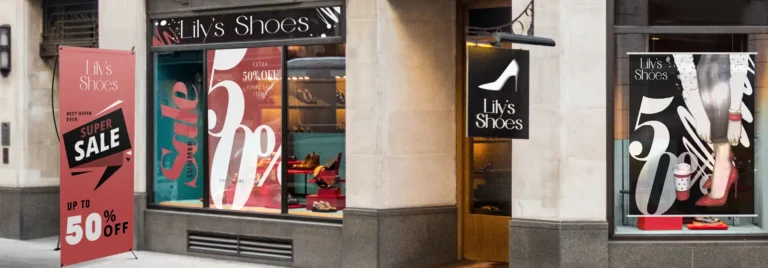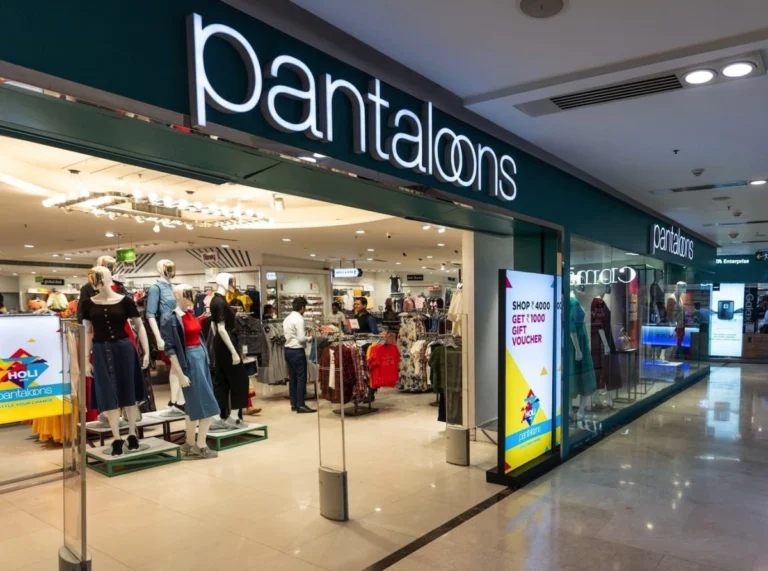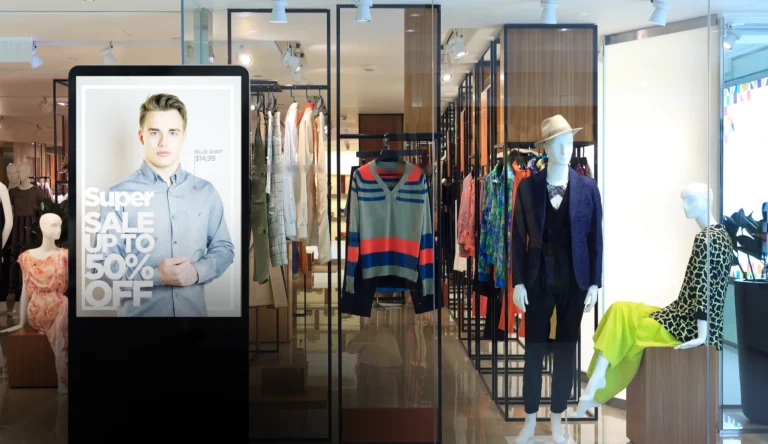January 6, 2025
Top Retail Signage Trends to Watch This Year !
I. Introduction to Retail Signage Trends

A. Importance of Signage in Retail
Signage is more than just a way to inform customers about what’s in your store. In fact, it’s like a warm welcome mat that invites customers in. Good signage not only guides shoppers but also reflects the personality of your brand. It can enhance the shopping experience, inspire purchases, and even create memorable interactions.
B. Overview of Current Trends
As consumer behavior continues to shift, so does retail signage. This year, we’re seeing a blend of sustainability, technology, and personalization. Businesses are stepping up to create signs that resonate with eco-conscious consumers and are more engaging than ever.
C. How Trends Evolve with Consumer Behavior
Understanding consumer behavior is key to creating effective signage. As shoppers become savvier, their expectations change. Retailers are adapting by keeping an eye on trends and incorporating elements that make shopping easier and more enjoyable, both in-store and online.
II. Sustainability in Retail Signage

A. Eco-Friendly Materials
A growing number of retailers are opting for signage made from sustainable materials, such as recycled plastics and biodegradable boards. These options not only help the planet but also cater to eco-conscious shoppers who appreciate brands that make responsible choices.
B. Energy-Efficient Display Solutions
Energy-efficient lighting for signs, like LED technology, is gaining popularity. It reduces energy consumption and enhances visual appeal without breaking the bank. Plus, many retailers are finding that energy-saving measures are an easy way to cut costs in the long run while improving their green credentials.
C. Recycling and Upcycling Initiatives
More businesses are looking to upcycle old signage materials into something fresh and inviting. This not only minimizes waste but can also create a unique aesthetic that tells a story about the brand’s commitment to sustainability.
III. Digital Signage Innovations

A. Interactive Displays
Gone are the days of static signs! Interactive displays are taking center stage, inviting customers to engage directly. Whether it’s through touchscreens or motion-sensor technology, these signs can communicate more dynamic messages, capturing the attention of passersby.
B. Dynamic Content Management
One of the most impressive aspects of digital signage is its ability to change. Retailers can update content in real-time based on inventory changes, time of day, or even the weather. This flexibility allows for promotions that feel timely and relevant, enhancing customer interest.
C. Integration with Mobile Devices
Imagine walking into a store and having the digital signage automatically update with offers tailored just for you! This integration is becoming more common, making shoppers’ experiences personalized and seamless.
IV. Personalization and Customization

A. Tailored Messaging for Target Audiences
Customers appreciate messaging that speaks directly to them. Retailers are using technology to tailor their signage based on demographics or shopping habits, ensuring that what they see resonates with their interests.
B. Use of Data Analytics for Signage
Data analytics allow retailers to understand what styles, messages, or promotions work best. By constantly analyzing customer feedback and shopping patterns, businesses can fine-tune signage for maximum impact.
C. Customer-Centric Design Approaches
Retailers are moving towards designs that prioritize user experience. Signs that are easy to read, visually appealing, and strategically placed can guide shoppers effortlessly through a store, allowing them to focus on enjoying their experience rather than stumbling over confusion.
V. Experiential Signage

A. Engaging In-Store Experiences
Experiential signage turns shopping into an adventure. It encourages interaction and draws shoppers in with unique displays or events that make the shopping experience memorable.
B. Multi-Sensory Elements
Adding elements like sound, smell, or texture to signage can enhance engagement. For example, a display with a scent that matches the product can create a lasting impression in a shopper’s mind.
C. Incorporating Virtual and Augmented Reality
As technology advances, virtual and augmented reality are becoming more accessible. Retailers can create immersive experiences that allow customers to visualize products in use or interact in ways that were previously impossible.
VI. Directional Signages in Retail Spaces

A. Enhancing Customer Navigation
Wayfinding signage is crucial in retail environments, especially larger stores or shopping centers. Clear and stylish signs help customers find their way, ensuring they can navigate effortlessly without frustration.
B. Creating a Seamless Shopping Experience
The right signage makes shopping feel natural and easy. When customers can find what they need quickly, they’re more likely to enjoy their time in the store and return in the future.
C. Strategic Placement for Maximum Impact
Where you place your signs makes a big difference. Thoughtful placement can draw attention to promotions or guide customers on their journey through the store, enhancing their shopping experience.
Conclusion :
A. Summary of Key Trends
From sustainability to personalization, this year’s signage trends reflect a shift toward more engaging and responsible retail practices. Retailers who stay ahead of these trends can enhance customer experiences and strengthen their brand presence.
B. Future Outlook for Retail Signage
Looking ahead, we can expect continued advancements in technology and design that will transform the way we view retail environments. Staying adaptable is key to thriving in this dynamic landscape.
C. The Role of Retail Signage in Brand Identity
Ultimately, effective signage is a powerful tool for reinforcing brand identity. It communicates not just information, but the essence of what a brand stands for, making it memorable in a busy marketplace.


